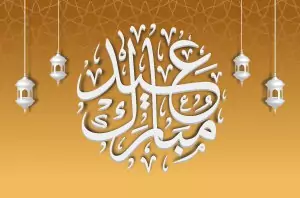Half of īmān is ṣabr: patience and perseverance. The other half is shukr: gratitude. Just as fasting teaches us ṣabr, it also helps us to cultivate shukr. Both of these are key provisions in our journey to Allah.
Throughout the day, whenever our stomachs growl from hunger, we should consciously remember and thank the One who provides us with every morsel of food, and every drop of water: Allah al-Qayyūm (The All-Sustainer).
We only appreciate the blessing of something when it is taken away from us. As people whose bellies are always full, we rarely experience hunger, and thus we fail to appreciate the magnitude of Allah’s blessings in a single slice of bread, let alone a myriad of delicacies! Thus, when we fast, and stay away from food, drink and lawful intimacy, we realise the blessings Allah has bestowed upon us. Not only does He give us these blessings, He has made them ḥalāl for us, and moreover when consumed with the correct intention, He actually rewards us for pleasurably partaking in them. This should fill our hearts with gratitude to Him.
Shukr consists of three elements: (1) To thank Allah by acknowledging His favours and praising Him with our tongues. (2) To thank Him by humbling our hearts to Him. (3) To thank Him with our bodies by using all of our body parts to obey Him.
We should thank Allah for our health, security, wealth, and children. And the greatest blessing we should thank Him for is īman and guidance. At the end of the verse about fasting, Allah says:
وَلِتُكْمِلُوْا الْعِدَّةَ وَلِتُكَبِّرُوا اللّٰهَ عَلَىٰ مَا هَدَىٰكُمْ وَلَعَلَّكُمْ تَشْكُرُوْنَ
“…So that you may complete the prescribed period and proclaim the greatness of Allah for guiding you, and that you may be grateful” (2:185).
Shukr itself is one of Allah’s greatest blessings, as shukr leads to even more blessings:
وَإِذْ تَأَذَّنَ رَبُّكُمْ لَئِنْ شَكَرْتُمْ لَأَزِيْدَنَّكُمْ
“And (remember) when your Lord proclaimed, ‘If you are grateful, I will certainly give you more (14:7)”.
If we desire to be blessed with the ability to do more good deeds and stay firm in worshipping Allah, the key to this is shukr.
We should thank Allah, especially, for blessing us with Ramaḍān: for allowing us to fast, whilst many of His servants do not do so; and for granting us the gift of qiyām and the Qur’ān, whilst many of His creation are deprived of it.
We should thank Allah for making Ramaḍān a month in which deeds are multiplied, sins are forgiven and duʿās are accepted. We should thank Him for chaining the rebellious devils, opening the doors of Paradise and closing the doors of the Hell-fire. And one of the greatest blessings we should thank Him for is that He has exclusively designated fasting for Himself and He will personally reward us for it as He says: ‘Fasting is for Me and I will (personally) reward it’ (Muslim).
The Joys of Iftar
You’ve had a long day at work, or maybe the kids have been driving you over the bend. It’s hot. You’re hungry and thirsty. Even the food your co-workers are eating suddenly seems so appetising. A few hours later, and the smell wafting from the kitchen is making your stomach growl.
And then it’s time for ifṭār. Allāhu Akbar! Who doesn’t experience happiness at the time of ifṭār?
Our beloved Messenger ﷺ said, “The fasting person will have two moments of joy: one when he opens his fast, and the other when he will meet his Lord” (Muslim).
At the time of ifṭār, we feel happy and grateful at being given the opportunity and the ability to complete an incredible act of worship (fasting). We feel happy at being able to lawfully eat and drink once again.
The Prophet ﷺ then reminds us that even though ifṭār fills us with happiness, there is an even greater source of happiness waiting for us in the next world.
It is from the sunnah of our beloved ﷺ to eat ifṭār early. He ﷺ said, “The people will remain well as long as they hasten the opening of the fast” (Bukhārī).
Ifṭār, just like fasting, teaches us obedience and taqwā. Throughout the day we give up on our desires, in obedience to Allah and to try to become closer to Him. And as the sun sets, we rush to eat in obedience to Allah and to try to become closer to Him. The timing is His, and not ours. We stop eating for Him, and we start eating for Him. In both cases, it is because He – Majestic and Exalted is He – has commanded us to do so.
We should open our fast with dates. Anas (raḍiy Allāhu ʿanhu) said, “The Messenger of Allah ﷺ used to open his fast with some fresh dates before he prayed. If there were no fresh dates, then with some dry dates. If there were no (dry dates), then he would drink a few sips of water” (Abū Dāwūd).
Once we have opened our fasts, we should say:
ذَهَبَ الظَّمَأُ ، وَابْتَلَّتِ الْعُرُوْقُ ، وَثَبَتَ الْأَجْرُ إِنْ شَاءَ اللهُ
“The thirst has gone, the veins have been moistened, and the reward has been secured, if Allah wills.”
We should take great care to avoid overeating at ifṭār time. The Prophet ﷺ said, “The son of Adam fills no vessel worse than his stomach. It is sufficient for him to eat what will support his back. But if he must (fill his stomach), then only a third (of its capacity) is for food, a third for drink and a third left (empty) for breathing” (Tirmidhī).
Some of the pious people of the past would eat a very light ifṭār, and then eat their main meal at suḥur, so that they could stand the night in worshipping Allah. Excessive food makes us sleepy and lethargic, and we are more likely to struggle with standing up in qiyām.
Likewise, we should eat nutritious, and ḥalāl food. Food which has not only been slaughtered in the ḥalāl way, but which has also been earned from a ḥalāl income. We should try to eat food which is pure and wholesome, for which animals have not been tortured or kept under oppressive conditions. Fried and fatty foods should also be avoided. Along with harming us, it will increase our thirst. If fasting and Ramaḍān is a 30-day spiritual detox, then it is also a physical detox. But this will only happen if we carefully observe what we eat and drink.
Once we finish eating, we should thank Allah and praise Him with the words of our beloved Prophet ﷺ.
The Prophet ﷺ said, “Indeed Allah is pleased with the servant who praises Him when he eats, and praises Him when he drinks” (Muslim).
Suhur: A Blessed Meal
The second meal for the believer in Ramaḍān is suḥūr/sehrī.
The Messenger of Allah ﷺ said, “There is blessing in eating suḥūr; so, do not skip it, even if one of you has a sip of water. For indeed Allah and His Angels invoke ‘ṣalāh’ on those who eat suḥūr” (Aḥmad).
By having suḥūr, we become recipients of ‘ṣalāh’ from Allah and His angels. The ṣalāh of Allah refers to Him praising us in the lofty assembly i.e. the elite angels who are close to Allah, and showering us with His mercy. The ‘ṣalāh’ of the angels refers to them seeking forgiveness for us. Allāhu Akbar! Imagine Allah (ʿazza wa jall) remembering you and the angels praying for you simply because you are eating suḥūr, whilst many others are sleeping at this blessed time.
The Messenger of Allah ﷺ said, “Eat suḥūr, for indeed there is blessing in it” (Bukhārī).
Suḥūr is blessed because it is a sunnah, and there is blessing in every single sunnah of our beloved ﷺ. Ibn Ḥajar (raḥimahullāh) explains that through suḥur, we distinguish ourselves from the People of the Book. Suḥur gives us strength to worship Allah, increases our energy levels, and protects us from a bad attitude and poor character that may arise from hunger (feeling ‘hangry’).
Likewise, suḥūr allows us to give charity to anyone who asks for it at that time, and allows us to share our meal at this time with the needy. Suḥūr is a fool proof method of ensuring we stand for Allah (ʿazza wa jall) and supplicate to Him in the last part of the night. Another advantage of suḥūr is that it allows us to make an intention of fasting if we had forgotten to do so before sleeping.
We should try to eat at least one date for suḥūr. Our beloved Prophet ﷺ said, “How excellent are dates as the believer’s suḥūr” (Abū Dāwūd).
Just like ifṭār, we should eat nutritious food and drink plenty of water. Slow-release energy foods are also beneficial to keep us going throughout the day.
The Messenger of Allah ﷺ said, “When Allah grants a blessing to a slave, upon which the slave praises Him, the praise of the slave is better than the blessing itself.” (Ibn Mājah)
May Allah al-Shakūr (The Most Appreciative) make us from His grateful servants, and may He bestow upon us the two moments of joy: the joy of ifṭār, and the joy of meeting Him and beholding His Noble Face.






